Dear Zazie, Here is today’s Lovers’ Almanac from Mac Tag dedicated to his muse. Who are you rememberin’? Rhett
The Lover’s Almanac
Dear Muse,
i walked into that room
not knowin’ i was walkin’
into a life changin’ moment
you stood up from the chair
you were sittin’ in,
and smiled
and i was slayed
i may git weary,
i sure git sad,
and there is much
that i have missed
but i have this
i met you
© copyright 2018 mac tag/cowboy coleridge all rights reserved
funny thing about time
sometimes it brings relief
sometimes, it enhances the pain
to say that i miss you
is to not say enough
to say that i want you
is the only truth i know
all that was
remains heaped
in my memories
and old dreams abide
so that now
in solitude
that which reigns…
so rememberin’ you
© copyright 2017 mac tag/cowboy Coleridge all rights reserved
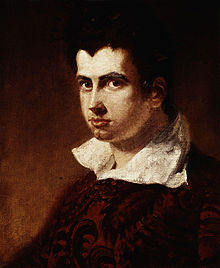
Today is the birthday of James Henry Leigh Hunt (19 October 1784 – 28 August 1859), best known as Leigh Hunt; essayist, poet, and writer.

In 1809, Leigh Hunt married Marianne Kent (whose parents were Thomas and Ann). Marianne, in ill health for most of her life, died 26 January 1857, aged sixty-nine. Leigh Hunt made little mention of his family in his autobiography. Marianne’s sister, Elizabeth Kent (Hunt’s sister-in-law), became his amanuensis.
Hunt’s financial affairs were in confusion, and only Percy Bysshe Shelley’s generosity saved him from ruin. In return he showed sympathy to Shelley during the latter’s domestic distresses, and defended him in the Examiner. He introduced Keats to Shelley and wrote a very generous appreciation of him in the Indicator.

Quotes
- Jenny kissed me when we met,
Jumping from the chair she sat in;
Time, you thief, who love to get
Sweets into your list, put that in.
Say I’m weary, say I’m sad,
Say that health and wealth have missed me;
Say I’m growing old, but add
Jenny kissed me.- “Jenny Kissed Me”, in The Monthly Chronicle (November 1838)
- Oh for a seat in some poetic nook,
Just hid with trees and sparkling with a brook!- Politics and Poetics
- The two divinest things this world has got,
A lovely woman in a rural spot!- Poem The Story of Rimini, iii, 257
- With spots of sunny openings, and with nooks
To lie and read in, sloping into brooks.- The Story of Rimini
- She dropped her glove, to prove his love, then looked at him and smiled;
He bowed, and in a moment leaped among the lions wild:
The leap was quick, return was quick, he has regained his place,
Then threw the glove, but not with love, right in the lady’s face.
“By God!” said Francis, “rightly done!” and he rose from where he sat:
“No love,” quoth he, “but vanity, sets love a task like that.”- The Glove and the Lions
- Stolen sweets are always sweeter,
Stolen kisses much completer,
Stolen looks are nice in chapels,
Stolen, stolen, be your apples.- Song of Fairies Robbing an Orchard.
- Confer Colley Cibber: “Stolen sweets are best.”
- It flows through old hushed Egypt and its sands,
Like some grave mighty thought threading a dream,
And times and things, as in that vision, seem
Keeping along it their eternal stands.- A Thought of the Nile
- and then we wake,
And hear the fruitful stream lapsing along
Twixt villages, and think how we shall take
Our own calm journey on for human sake.- A Thought of the Nile
- That there is pain and evil, is no rule
That I should make it greater, like a fool.- A Thought or Two on Reading Pomfret’s “Choice”, in The Poetical Works of Leigh Hunt, London: Edward Moxon, 1846, p. 147.
| Theodoros Vryzakis | |
|---|---|

Portrait by Ludwig Thiersch (c. 1845/50)
|
|
Today is the birthday of Theodoros Vryzakis (Thebes; 19 October 1819- 6 December 1878 Munich); painter, known mostly for his historical scenes. He was one of the founders of the “Munich School”, composed of Greek artists who had studied in that city.
Gallery
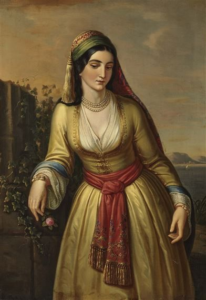
-

The Sortie of Messolonghi (1853)
-

The Consolation (1856)
-

The Reception of Lord Byron at Missolonghi (1861)
-

The Camp of Georgios Karaiskakis (1855)
-

Grateful Hellas (1858)
| Umberto Boccioni | |
|---|---|

Umberto Boccioni self-portrait (1905)
|
|
Today is the birthday of Umberto Boccioni (Reggio Calabria; 19 October 1882 – 17 August 1916 Verona); painter and sculptor. He helped shape the revolutionary aesthetic of the Futurism movement as one of its principal figures. Despite his short life, his approach to the dynamism of form and the deconstruction of solid mass guided artists long after his death. His works are held by many public art museums, and in 1988 the Metropolitan Museum of Art in New York organized a major retrospective of 100 pieces.
Gallery
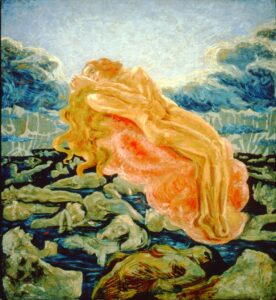
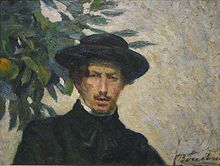








-

States of Mind III; Those Who Stay, 1911, Museum of Modern Art, New York
-

Modern Idol, 1911, Estorick Collection of Modern Italian Art, Islington, London
-
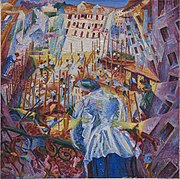
The Street Enters the House, 1911, Sprengel-Museum, Hanover
-
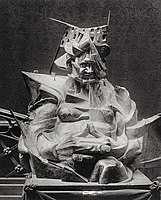
Head + House + Light, 1912, sculpture destroyed
-

Visioni simultanee, 1912, Von Der Heydt Museum, Wuppertal
-

L’antigrazioso, 1912, private collection
-

Dynamism of a Man’s Head, 1913, private collection
-

Dynamism of a Soccer Player, 1913, Museum of Modern Art, New York
-

Charge of the Lancers, 1915, Collection of Riccardo and Magda Jucker, Milan
-

Horizontal Volumes, 1915, Solomon R. Guggenheim Museum
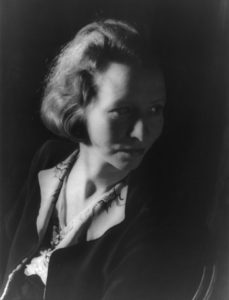 And on this day in 1950, poet Edna St. Vincent Millay died at her home, Steepltop, in Austerlitz, New York. In my opinion she wrote some of the best sonnets of the century. She was also well known for her affairs with both men and women. In 1923 she married Eugen Jan Boissevain (1880–1949), the widower of the labor lawyer and war correspondent Inez Milholland, a political icon Millay had met during her time at Vassar. Both Millay and Boissevain had other lovers throughout their twenty-six-year marriage. Millay’s most significant such relationship during this time was with the poet George Dillon for whom she wrote a number of her sonnets. Milly and Dillon collaborated on translations from Charles Baudelaire‘s Les Fleurs du Mal in 1936. Of course, the Poem of the Day is a Sonnet from Millay. It is typically called “Sonnet No. 2: Time does not bring relief; you all have lied.” I changed him/his to her and I call it:
And on this day in 1950, poet Edna St. Vincent Millay died at her home, Steepltop, in Austerlitz, New York. In my opinion she wrote some of the best sonnets of the century. She was also well known for her affairs with both men and women. In 1923 she married Eugen Jan Boissevain (1880–1949), the widower of the labor lawyer and war correspondent Inez Milholland, a political icon Millay had met during her time at Vassar. Both Millay and Boissevain had other lovers throughout their twenty-six-year marriage. Millay’s most significant such relationship during this time was with the poet George Dillon for whom she wrote a number of her sonnets. Milly and Dillon collaborated on translations from Charles Baudelaire‘s Les Fleurs du Mal in 1936. Of course, the Poem of the Day is a Sonnet from Millay. It is typically called “Sonnet No. 2: Time does not bring relief; you all have lied.” I changed him/his to her and I call it:
Rememberin’ Her
Time does not bring relief; you all have lied
Who told me time would ease me of my pain!
I miss her in the weeping of the rain;
I want her at the shrinking of the tide;
The old snows melt from every mountain-side,
And last year’s leaves are smoke in every lane;
But last year’s bitter loving must remain
Heaped on my heart, and my old thoughts abide
There are a hundred places where I fear
To go,— so with her memory they brim
And entering with relief some quiet place
Where never fell her foot or shone her face
I say, “There is no memory of her here!”
And so stand stricken, so remembering her!
The Song of the Day is “Remembering” by Avishai Cohen Trio.
I stand stricken, often, so rememberin’ you.
Mac Tag

No Comments on "The Lovers’ Almanac 19 October – rememberin’ you part two – verse by Leigh Hunt – art by Theodoros Vryzakis & Umberto Boccioni"